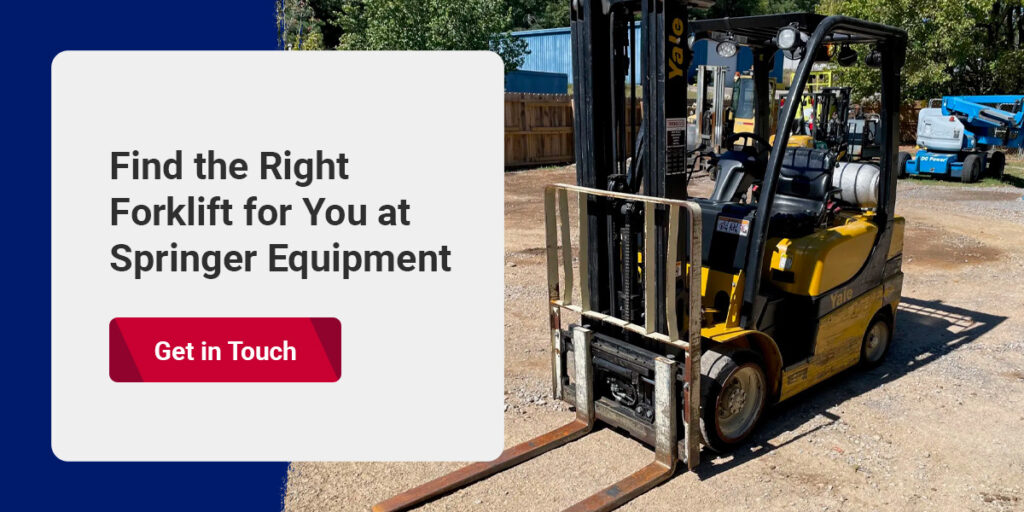Forklifts are critical equipment for processes across industries. Whether your team works in a warehouse or on construction sites, you want your forklift to reflect your needs. When considering your requirements, a model’s fuel type is one of the most important features. Propane fuel has advantages and drawbacks, so understanding both can help you feel confident in your next purchase.
Benefits of Propane Forklifts
Propane forklifts can be an excellent investment for many diverse operations. Understanding the benefits can help you determine whether a propane model is the best option for your needs.
Convenient Fueling
Forklifts that use propane have a very easy refueling processes. These models have a propane tank on the back that operators can quickly detach and replace with a new one. The process only takes a few minutes, and your team can handle it easily in the field.
Quick refueling means limited downtime. Running out of power can put your project on hold, and when you’re working on a tight timeline, you want to stay moving as often as possible. Propane forklifts make long run times possible.
Lower Upfront Costs
Propane models are typically one of the more affordable forklift types. This lower upfront cost allows you to spend your budget on other areas of your business.
Versatility
Propane forklifts are suitable for a wide variety of applications, from outdoor jobs to well-ventilated indoor areas. These models also come in various sizes and lifting capacities so you can meet your application needs.
Another versatile aspect of the propane forklift is its ability to run in all types of environments. You can trust them to navigate all terrains without damaging the undercarriage.
Minimal Storage Requirements
Compared to electric models, propane forklifts have less storage requirements. You only need space in your warehouse or facility to park your forklift because propane tanks can be stored outside. With electric models, you need extra storage space for spare batteries and charging stations, which can make keeping your equipment safe far more complex.
Disadvantages of Propane Forklifts
While the above benefits may be enough to sell you on propane forklifts, you should consider these potential disadvantages of LPG forklifts.
Low Rear Visibility
While the propane tank is accessible and easy to change, it also sticks out from the back of the equipment. The size and bulk of these propane tanks can greatly reduce rear visibility, making it harder to back up safely. Low visibility can be a significant disadvantage if you need to use your forklift in spaces with heavy foot traffic.
Unpredictable Fuel Costs
The price of liquid propane fluctuates frequently based on shifts in the market. This fact can make it harder to predict expected fuel costs. For some buyers, the lower initial investment for this equipment balances the higher cost of ownership, especially when buying used models.
Emissions
When liquid propane burns, it creates exhaust fumes that are harmful to workers. If you operate indoors, consider ventilation and employee health. These emissions can also be detrimental to food products, so an electric model is likely a better option if you’re operating in food storage. These fumes are less of an issue for teams that work outdoors.
Find the Right Forklift for You at Springer Equipment
At Springer Equipment, we sell used forklifts to fit your project demands. We carry forklifts of all fuel types, including liquid propane. Explore our selection to see whether one of our models is right for your needs and budget. Looking for additional guidance? Get in touch with our team to learn more about our used propane forklifts for sale.


